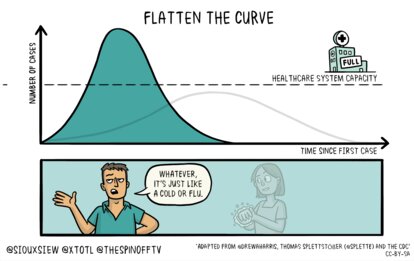Covid-19
Personal responsibility for flattening the epidemiological curve
"We've never had a pandemic caused by a corona virus before. This is the first such case. At the same time, we have never had a pandemic that we can control before, "said World Health Organization (WHO) Director-General Tedros Adhan in midweek when the global virus pandemic was officially declared. Adhanom added that this is "everyone's thing", that we are in it together and that all states still have a chance to change the course of the pandemic.
This message is addressed to everyone: one, significant, part relates to individual states - governments, political leaders and health systems who need to do everything in their power to suppress the spread of the virus corona, calm and protect their citizens. The second part is an appeal to individuals to be responsible and take all the precautionary measures at their disposal to help reduce the harmful effects of the pandemic as far as possible.
By all accounts, it is no longer a question at this point whether the number of infected in ours or any other affected country will increase - the question is when and how much. The experiences of China, South Korea and Italy show us the importance of preventive action, timely and transparent reporting, as well as measures that can help combat the spread of the virus. This is why many events around the world have been cancelled or postponed - among them the NBA season, Disney Parks (this is Disneyland and Disneyworld's first closure since the terrorist attack in 2001), as well as numerous concerts, conferences , as well as planned trips, which is a major blow to tourism and certain industries globally.
In addition to cancelling planned activities, a number of companies advise employees to work from home in situations where this is possible. As is not always the case, many individuals engage in campaigns advocating self-isolation, responsible behaviour, and reducing contact with others - on social media, we can follow these campaigns through the hashtags #StayTheFuckHome (stay at home), #CancelEverything (cancel everything) and #FlattenTheCurve (let's drop the epidemiological curve).
What is the epidemiological curve and how can we put it down?
At the center of the story is the epidemic curve, or, more briefly, the epi curve. This is a curve on the chart that shows how quickly and with the intensity of the corona the virus is spreading (that is, how many new identified cases we have from day to day), and what it might look like if the necessary prevention measures are taken.

The idea of the chart is to show that further development of the pandemic is not out of our hands. Noting that the most important measure is to thoroughly and regularly wash those same hands, the prospect of lowering the epi-curve tells us that not being able to stop the spread of the virus corona at once does not mean that we cannot slow its transmission and maximize the ability of healthcare systems to cope with the increasing number of infected.
"We have to lower that curve," explained the director of the US National Institute of Allergy and Infectious Diseases during a White House meeting, adding that this can be achieved by "affecting the natural course of the infection." The best way to do this is to reduce the chance of the virus spreading further - which means reducing physical contact between people. Measures by governments around the world to ban or cancel rallies, especially indoors with large numbers of people, are an important step in curbing the course of a pandemic. Measures that are more drastic include the introduction of quarantines and travel bans, which is currently taking place in Italy. Suspension in schools and universities is in force in a number of cases, but the WHO still estimates that this is not a measure that should be implemented in every country that records cases of patients.
As no vaccine for COVID-19 has been made yet, the biggest burden is on health care providers, which have to withstand the pressure of a growing number of patients - this includes everything from testing, to treating patients, to overloading the health system due to the relative reluctance to pandemic. It is enough to think about the number of respirators available, as well as those suffering from other diseases currently in health care facilities. Lowering the epi-curve means giving doctors and other medical professionals’ time to cope with the growing number of COVID-19 patients as best they can.
"It is very difficult to muster the political will at an early stage of an epidemic and introduce costly, disruptive infectious control measures," said David Fisman, an epidemiologist at the University of Toronto who participated in the development of an interactive model pointing to the possible scale of the epidemic in the United States. Fisman stressed that it was very important to introduce “aggressive interventions” as early as possible, which primarily meant, “aggressive social distancing”, that is, minimizing human contact. The measure "can significantly reduce the effects of epidemics, including the near collapse of health systems, which we are currently looking at in Italy," Fisman added.
Epidemiologist from the same university, Ashley Tuit, explained that the idea behind the interactive model is not to predict the future, but the point is "to help people understand why we should change behavior and restrict our own movement, but also to give people an idea of the possible effects of these change."
Stay the fuck home: individuals' responsibility for public health
Restrictions on movement, cancellation of rallies, procurement of respirators, introduction of telephone lines, timely and transparent reporting to citizens on developments regarding the corona virus are all measures that officials and professionals can take to deal with the current public health situation. This, of course, does not mean that at the individual level, we cannot make a significant contribution to lowering the epi-curve, and that is precisely the focus of campaigns currently underway on social networks.
The most popular of these is #StayTheFuckHome, or "stay at home," within which we can follow practical tips for responsible behaviour at the individual level. It is important to note that these, as well as other campaigns, do not represent official sources of medical professionals, and it is also important to check the information we obtain or rely on credible sources. In Serbia, the Portal Raskrinkavanje has launched a live blog where it checks data of corona virus and suppresses the spread of misinformation.
The #StayTheFuckHome website has a "manifest of self-isolation" or self-initiated quarantine that, among other things, advises the following:
- Don't panic, but be careful
- Wash your hands regularly and obey sneeze and cough rules
- Do your best to touch the face as little as possible
- Practice social distance / distance, don't hug and kiss, shake or throw five
- Avoid concerts, shows, sporting events or any other mass events
- If not really necessary, avoid public transportation
- Do not leave the house unless absolutely necessary
On the same line is the #SafeHands Challenge launched by WHO on social networks, which promotes thorough and regular hand washing to slow down a pandemic:
Numerous individuals have decided to engage in the appeal - both to states and companies and citizens - to make the maximum contribution to slowing down the pandemic and reducing its effects.
A particular aspect is job-related - although, unfortunately, not everyone is able to work from home, those companies and individuals who have the responsibility to influence the further course of the pandemic, as many have done already, including large tech companies like Twitter, Facebook, Google and Amazon. In addition to reducing contact with others, this also leads to avoiding public transport, as well as the inevitable meeting potentially infected.
At this moment, it is not clear what the future measures of the Government of Serbia will look like when it comes to dealing with the COVID-19 infection, and it is our responsibility to contribute as much as possible to counteracting its spread and its negative consequences. This responsibility involves following the advice of relevant and professional sources, informing and relying on proven sources, appealing to acquaintances, avoiding public transportation, cancelling (mass) gatherings, and finally, in situations where practicable, generally avoiding leaving home.
If possible, we stay at home to influence the further course of the pandemic and show personal responsibility for the health of all our fellow citizens.
deputy editor-in-chief, TALAS
